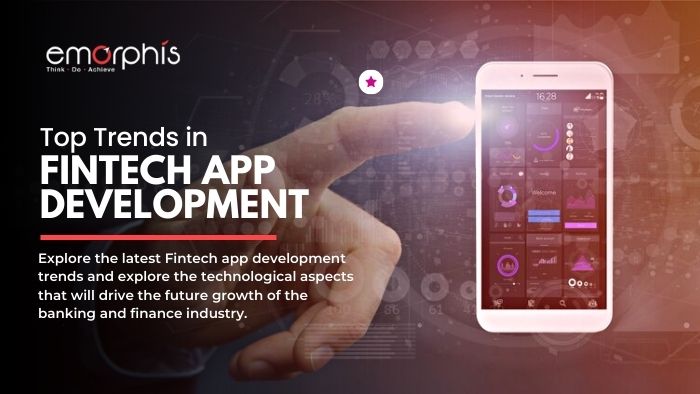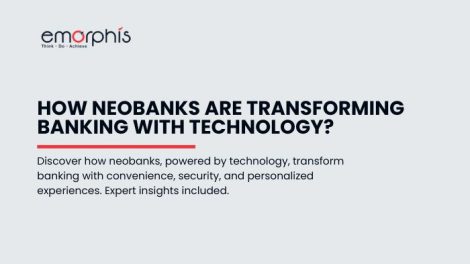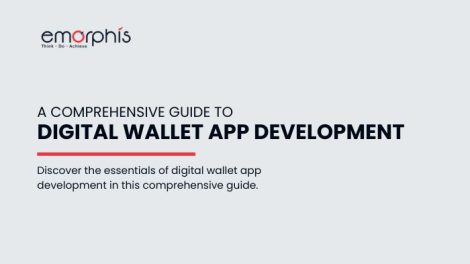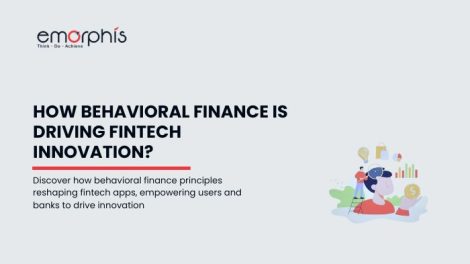Introduction
The world of financial technology, commonly known as fintech, has experienced remarkable growth and innovation in recent years. As we enter the years 2023-2024, several top emerging fintech app development trends, shaping the future of financial services. In fact, these trends encompass the integration of cutting-edge technologies, evolving customer expectations, and the pursuit of enhanced user experiences.
Fintech apps are revolutionizing how we manage our finances, offering personalized services, streamlined processes, and improved security. In this article, we will explore the top trends in fintech app development and delve into their implications for users and the financial industry as a whole. From artificial intelligence and machine learning to open banking, blockchain integration, and more, these trends have the potential to redefine the way we interact with our finances, driving innovation and also transforming the landscape of financial services.
Click the link to explore the various types of Fintech applications
Let’s check into the exciting world of fintech app development and discover the trends that will shape the industry in the years to come.
Top Trends in Fintech App Development
A. Artificial Intelligence (AI) and Machine Learning (ML)

Artificial Intelligence (AI) and Machine Learning (ML) are advanced technologies that play a crucial role in fintech app development. These technologies enable apps to provide personalized experiences to users based on their specific needs and preferences. They can analyze large amounts of data and make intelligent predictions and recommendations.
One significant benefit of AI and ML in fintech apps is their ability to enhance fraud detection and prevention. In fact, by analyzing patterns and behaviors, these technologies can identify suspicious activities and alert users or take preventive measures to safeguard their financial transactions.
Another advantage is the automation of customer support. AI-powered chatbots and virtual assistants can handle customer queries and provide assistance round-the-clock. They can quickly respond to frequently asked questions, offer relevant information, and also guide users through various financial processes.
Furthermore, AI and ML can provide intelligent financial recommendations tailored to individual users. These recommendations can range from personalized investment options and savings plans to budgeting strategies also. By analyzing user data and financial goals, fintech apps can offer valuable insights to help users make informed decisions and also achieve their desired financial outcomes.
Click to learn How AI Chatbots are Empowering FinTech Industry
B. Biometric Authentication

Biometric authentication is becoming more prevalent in fintech app development trends, with features like fingerprint scanning, facial recognition, and voice recognition being widely adopted. These methods provide a higher level of security and convenience compared to traditional passwords or PINs.
Imagine using a fintech app that utilizes biometric authentication. Instead of remembering complex passwords or worrying about someone guessing your PIN. You can simply use your fingerprint, face, or voice to securely access your financial information and perform transactions. This eliminates the risk of someone gaining unauthorized access to your account through stolen or weak passwords.
Biometric authentication methods are unique to each individual, making them difficult to replicate or fake. For example, your fingerprint has distinct patterns, your face has unique features, and your voice has distinct characteristics. This adds an extra layer of security, as it is highly improbable for someone to replicate these biometric traits.
Furthermore, biometric authentication offers convenience. With just a simple scan of your fingerprint, a quick facial recognition scan, or a spoken passphrase. You can swiftly access your financial data and conduct transactions without the hassle of entering passwords or PINs.
C. Open banking

Open banking is also one of the growing trends in fintech app development. It promotes collaboration between traditional banks and fintech startups. Through open banking initiatives, fintech apps can securely access customer banking data with the help of open APIs (Application Programming Interfaces). This access enables the development of innovative financial services and features within these apps.
Imagine you have multiple bank accounts with different financial institutions. Rather than logging into each bank’s individual app or website to check your balances and transactions. A fintech app that embraces open banking can offer you a consolidated view of all your accounts in one place.
Upon linking your various bank accounts to the fintech app. The app securely accesses your banking data through the open APIs provided by the respective banks. It retrieves your account information, including balances, transaction history, and other relevant details. This information is then presented to you within the app’s interface, providing a comprehensive overview of your finances.
Furthermore, the fintech app can leverage this open banking access to offer budgeting tools and financial management features. It can analyze your spending patterns across all linked accounts, categorize expenses, and provide insights into your financial habits. The app can also generate personalized budgeting recommendations and help you track your progress toward financial goals.
Additionally, open banking enables seamless payment integrations within fintech apps. For example, you can initiate payments directly from the app, without the need to switch to a separate banking app or website. The app securely interacts with the bank’s payment systems through the provided APIs, ensuring a smooth and convenient payment experience.
D. Blockchain and Cryptocurrency Integration

Blockchain technology and cryptocurrency integration have become significant drivers of innovation in the fintech industry. In fact, fintech app development trends of cryptocurrency itself created a separate vertical. Fintech apps are incorporating blockchain for secure and transparent transactions, smart contracts, and decentralized finance (DeFi) applications. Additionally, they are integrating crypto wallets and popular cryptocurrencies to expand their offerings.
Blockchain technology enables secure and transparent transactions by recording them on a decentralized and immutable ledger. Fintech apps leverage this technology to enhance the security and integrity of financial transactions. Thus reducing the risk of fraud and unauthorized alterations.
Smart contracts, another key aspect of blockchain, enable automated and self-executing agreements. Fintech apps utilize smart contracts to streamline various financial processes, such as loan agreements, insurance claims, or supply chain management. By automating these processes, the apps eliminate the need for intermediaries, increase efficiency, and reduce costs.
Decentralized finance (DeFi) is an emerging field within fintech that leverages blockchain for the creation of decentralized financial applications. Fintech apps integrate DeFi protocols to provide users with access to decentralized lending and borrowing platforms. Also, decentralized exchanges, yield farming, and other innovative financial services. These applications aim to offer greater financial autonomy, transparency, and inclusivity to users.
Furthermore, fintech apps are integrating crypto wallets to enable users to securely store, manage, and transact with cryptocurrencies. By incorporating popular cryptocurrencies such as Bitcoin, Ethereum, or stablecoins, these apps allow users to participate in the digital currency ecosystem seamlessly. With these trends in fintech app development, users can make payments, send remittances, or invest in cryptocurrencies directly within the app.
Click to check the details of the latest Fintech App Development Strategies.
E. Embedded Finance

Embedded finance is an emerging trend in the fintech industry where financial services are integrated into non-financial platforms or applications. It involves seamlessly incorporating financial products and services within the user experience of other platforms such as e-commerce websites, mobile apps, or software solutions.
With embedded finance, businesses outside of the traditional financial sector can offer their customers a range of financial services. For example, an e-commerce platform can integrate payment processing services, allowing customers to make purchases directly on the platform without being redirected to a separate payment gateway.
This trend is enabled by open APIs and partnerships between fintech companies and non-financial businesses. By leveraging these APIs, non-financial platforms can access a wide range of financial services, including payments, lending, insurance, savings, and more. This integration streamlines the customer journey, enhances convenience, and creates new revenue streams for both the non-financial platform and the fintech provider.
An example of embedded finance is a ride-hailing app that offers its drivers instant access to earnings through a partnership with a fintech company. Instead of waiting for weekly or monthly payouts, drivers can access their earnings immediately through the app. The embedded finance solution integrates a digital wallet and payment processing functionality, allowing drivers to receive their earnings instantly and even make payments directly within the app.
Embedded finance has the potential to transform various industries by simplifying financial transactions, improving user experiences, and expanding access to financial services. It blurs the lines between traditional banking and non-financial sectors, creating new opportunities for businesses to leverage financial technology and provide added value to their customers.
F. Robo-advisors and Automated Investing

Robo-advisors and automated investing are innovative solutions in the fintech industry that utilize technology and algorithms to provide personalized investment advice and automated portfolio management.
In fact, Robo-advisors are online platforms that use algorithms and artificial intelligence to provide financial advice and investment recommendations. They gather information about investors’ goals, risk tolerance, and financial situation through online questionnaires. Based on this data, the robo-advisor algorithm generates a customized investment plan that aligns with the investor’s objectives.
The automated investing process begins with the allocation of funds into a diversified portfolio of investments such as stocks, bonds, and exchange-traded funds (ETFs). The robo-advisor continually monitors the portfolio and adjusts it as needed based on market conditions and the investor’s preferences. This dynamic management aims to optimize returns while maintaining an appropriate level of risk.
Some more details on robo-advisors
One of the advantages of robo-advisors is their ability to provide cost-effective investment solutions. They typically charge lower fees compared to traditional human financial advisors since they rely on automation and digital platforms. This makes investing more accessible to a broader range of individuals, including those with smaller investment amounts.
Robo-advisors also offer convenience and ease of use. Investors can access their investment accounts through mobile apps or web interfaces, allowing them to monitor their portfolios, track performance, and make adjustments at any time.
Furthermore, robo-advisors often incorporate advanced features such as tax optimization, automatic rebalancing, and goal-based investing. These features help investors minimize tax liabilities, maintain their desired asset allocation, and work towards specific financial goals.
An example of a robo-advisor in action is an individual who wants to invest for retirement. They sign up for a robo-advisor service and answer questions about their risk tolerance, time horizon, and financial goals. Based on this information, the robo-advisor algorithm recommends an investment portfolio consisting of a mix of stocks and bonds. The investor decides to proceed with the recommended portfolio and deposits funds into their account. From that point on, the robo-advisor monitors the portfolio, automatically rebalances it if necessary, and provides periodic reports on performance and progress toward retirement goals.
Robo-advisors and automated investing have gained popularity due to their affordability, convenience, and ability to provide personalized investment advice. They offer a technology-driven solution for individuals who seek a hassle-free and accessible way to invest their money while benefiting from professional guidance.
G. RegTech

Regulatory technology, or RegTech, is a term used to describe the use of technology to facilitate regulatory compliance in the financial industry. Fintech apps are increasingly adopting RegTech solutions to simplify and automate various compliance tasks. These solutions utilize advanced technologies such as artificial intelligence, machine learning, and data analytics to monitor transactions, detect potential risks, and ensure adherence to regulatory requirements.
By integrating RegTech into their apps, fintech companies can automate processes such as customer due diligence, identity verification, and risk assessment. This automation helps reduce manual effort, minimize errors, and improve the efficiency of compliance operations.
RegTech solutions also play a crucial role in monitoring transactions for suspicious activities, such as money laundering or fraud. They can analyze large volumes of data in real time, identify patterns, and flag potentially risky transactions for further investigation. This helps financial institutions stay compliant with anti-money laundering (AML) and counter-terrorism financing (CTF) regulations.
Furthermore, RegTech enables fintech apps to keep pace with ever-changing regulatory landscapes. These solutions can monitor and analyze regulatory updates, ensuring that the apps remain up-to-date with the latest compliance requirements. This helps fintech companies proactively adapt their processes and systems to maintain compliance and avoid regulatory penalties.
By incorporating RegTech solutions, fintech apps can enhance their compliance capabilities, reduce operational costs, and improve the overall customer experience. These technologies provide a more efficient and accurate way to manage regulatory compliance, allowing fintech companies to focus on innovation and delivering value to their customers while meeting regulatory obligations effectively.
H. Personal Finance Management

Fintech apps are revolutionizing personal finance management by empowering users to take control of their financial lives. These apps offer a range of tools and features designed to simplify and optimize various aspects of personal finance.
Expense tracking is a fundamental feature of personal finance management apps. Users can link their bank accounts and credit cards to the app, which automatically categorizes and tracks their expenses. This provides a clear overview of where their money is going and helps identify areas where they can save or cut back.
Budgeting tools are another essential component of these apps. Users can set monthly budgets for different categories such as groceries, entertainment, or transportation. The app then tracks their spending in real time and sends notifications when they are nearing or exceeding their budget limits. This helps users stay disciplined and make conscious spending decisions.
Fintech apps also assist users in setting financial goals. Whether it’s saving for a vacation, a down payment on a house, or building an emergency fund, these apps provide goal-setting features. Users can set specific targets, track their progress, and receive reminders to stay on track. Some apps even offer gamification elements or rewards to motivate users to achieve their goals.
Some more details on personal finance
Financial education is another valuable aspect of personal finance management apps. They provide educational content, tips, and resources to improve users’ financial literacy. This helps users gain a better understanding of concepts like investing, debt management, and saving strategies. By educating users, these apps empower them to make informed financial decisions and build healthier financial habits.
Furthermore, fintech apps offer investment insights and guidance. They provide users with personalized investment recommendations based on their financial goals, risk tolerance, and time horizon. Some apps even offer automated investment features, where users can invest their money in diversified portfolios based on their preferences. This enables users to grow their wealth and work towards their long-term financial objectives.
In summary, fintech apps are transforming personal finance management by providing users with powerful tools to track expenses, set budgets, achieve financial goals, access educational resources, and make smarter investment decisions. These apps empower individuals to take control of their finances, improve their financial well-being, and work towards a more secure and prosperous future.
I. Voice-enabled Banking

Voice-enabled banking is a growing trend in the fintech industry that leverages voice assistants and smart speakers to provide users with convenient and hands-free access to banking services. Fintech apps are integrating voice recognition technology, such as Amazon Alexa or Google Assistant, to enable users to perform various banking tasks using simple voice commands.
With voice-enabled banking, users can check their account balances, review recent transactions, make payments, and transfer funds by simply speaking to their device. This eliminates the need to log in to a mobile app or website and manually navigate through menus or enter text-based commands. Users can access their financial information and initiate transactions with ease, making banking more accessible and user-friendly.
Voice-enabled banking offers several benefits. Firstly, it enhances convenience by allowing users to perform banking tasks while engaged in other activities, such as cooking, driving, or exercising. Instead of having to stop what they are doing and use their hands to interact with a mobile device, users can simply speak their commands and receive immediate responses.
Secondly, voice-enabled banking improves accessibility for individuals with visual impairments or limited dexterity. By relying on voice commands, these users can easily interact with fintech apps and access their financial information without the need for visual or manual input.
Some more details on voice-enabled banking
An example of voice-enabled banking in action is a user asking their smart speaker, “Alexa, what is my account balance?” The voice assistant retrieves the user’s account information from the integrated fintech app and responds with the current balance. The user can then follow up with commands like “Alexa, pay my utility bill” or “Alexa, transfer $100 to my savings account” to initiate transactions.
However, it’s important to note that security measures are of utmost importance in voice-enabled banking. Fintech apps must implement robust authentication protocols and voice recognition algorithms to ensure that only authorized users can access sensitive financial information or perform transactions.
In summary, voice-enabled banking is transforming the way users interact with fintech apps by leveraging voice recognition technology. It offers convenience, accessibility, and a hands-free banking experience. By integrating voice assistants and smart speakers, fintech apps are enhancing the user experience and making banking tasks more seamless and effortless.
J. Enhanced Data Security

Enhanced data security is a top priority for fintech apps in response to the increasing concern over data breaches and cyber threats. These apps are implementing robust measures to protect user data and ensure the confidentiality, integrity, and availability of sensitive financial information. Here are some points strengthening data security in the development of fintech apps:
Key aspects of enhanced data security in fintech app development
- End-to-End Encryption: Fintech apps are employing end-to-end encryption protocols to secure user data during transmission and storage. This ensures that data is encrypted at the point of origin, remains encrypted during transit, and can only be decrypted by authorized recipients. It prevents unauthorized access to sensitive information, even if intercepted during transmission.
- Biometric Authentication: Fintech apps are increasingly adopting biometric authentication methods, such as fingerprint scanning, facial recognition, and voice recognition. These methods offer enhanced security by using unique biometric characteristics to verify user identities. Biometric authentication adds an additional layer of protection, making it difficult for unauthorized individuals to gain access to sensitive financial data.
- Secure Cloud Storage: Fintech apps are leveraging secure cloud storage solutions to store user data. These cloud platforms employ advanced security measures, such as data encryption, access controls, and regular security audits, to safeguard user information from unauthorized access. Storing data in the cloud also provides data redundancy and disaster recovery capabilities, ensuring data availability even in the event of hardware failures or natural disasters.
- Compliance with Data Privacy Regulations: Fintech apps are committed to adhering to strict data privacy regulations, such as the General Data Protection Regulation (GDPR) or the California Consumer Privacy Act (CCPA). They implement privacy policies and practices that outline how user data is collected, used, stored, and shared. This ensures transparency and accountability in handling user data and gives users control over their personal information.
- Robust Security Testing: Fintech apps undergo thorough security testing to identify and address vulnerabilities before they can be exploited by attackers. This includes conducting regular security assessments, vulnerability scanning, penetration testing, and code reviews. By proactively identifying and resolving security weaknesses, fintech apps can better protect user data and minimize the risk of breaches.
Some more details on enhanced data security
An example of enhanced data security in action is a fintech app using end-to-end encryption to secure user communications and transactions. When a user initiates a payment or submits personal information, the app encrypts the data before transmission, ensuring that it remains unreadable to unauthorized parties. The data is only decrypted by the recipient who possesses the necessary encryption keys.
in fact, fintech apps are placing significant emphasis on enhanced data security to protect user information from data breaches and cyber threats. By implementing measures such as end-to-end encryption, biometric authentication, secure cloud storage, and compliance with data privacy regulations, these apps aim to create a safe and trusted environment for users to manage their financial activities with confidence.
Click the link to uncover the cutting-edge technologies driving innovation in Financial Services and BFSI, and understand the pivotal role played by Salesforce Financial Services Cloud
Why Hire Emorphis Technologies as Your Fintech App Development Partner?

There are several compelling reasons to consider hiring Emorphis Technologies as your fintech app development company. Emorphis is a reputable and experienced company that specializes in providing cutting-edge software solutions for the finance industry. Here are some key reasons why Emorphis stands out:
1. Expertise in Finance
Emorphis has extensive expertise in finance software development. They have a deep understanding of the financial industry’s unique challenges and requirements, allowing them to develop tailored solutions that address specific business needs.
2. Technical Excellence
Emorphis boasts a team of skilled and experienced software developers who are well-versed in the latest technologies and frameworks. They have a track record of delivering high-quality and scalable finance software solutions that meet industry standards.
3. Customized Solutions
Emorphis understands that each finance business is unique, and one-size-fits-all solutions may not suffice. They offer customized software development services, working closely with clients to understand their specific goals and requirements, and delivering solutions that align with their business objectives.
4. Security and Compliance
In the finance industry, data security and compliance are of paramount importance. Emorphis prioritizes data security, employing robust encryption and secure coding practices to ensure that sensitive financial information is protected. They also ensure compliance with relevant regulations and industry standards.
5. Seamless Integration
Emorphis specializes in integrating finance software solutions with existing systems and third-party applications. Whether it’s integrating with banking APIs, payment gateways, or other financial platforms, Emorphis can seamlessly connect different components to create a cohesive and efficient software ecosystem.
6. User-Centric Approach
Emorphis places a strong emphasis on user experience and usability. They design intuitive and user-friendly interfaces that make it easy for users to navigate and interact with the software. Emorphis conducts user research and testing to ensure that the software meets the needs of end-users and enhances their productivity.
7. Timely Delivery
Emorphis is known for its commitment to delivering projects on time and within budget. They follow a well-defined project management approach, setting clear milestones and providing regular updates to clients. Their efficient development process ensures the timely completion of projects without compromising on quality.
8. Ongoing Support
Emorphis provides comprehensive support and maintenance services for finance software solutions. They offer post-development support, including bug fixes, updates, and enhancements, to ensure the software continues to perform optimally and adapt to evolving business needs.
Emorphis brings a wealth of expertise, technical excellence, customized solutions, security, and compliance to finance software development projects. Their focus on seamless integration, user-centric design, timely delivery, and ongoing support makes them a reliable partner for businesses seeking innovative and robust finance software solutions.
Click to check more details on Fintech app development services
Conclusion
In conclusion, the trends discussed above provide a glimpse into the exciting developments in fintech app development. From AI and ML to biometric authentication, open banking, blockchain integration, and more, these trends are revolutionizing the way we manage our finances.
Fintech apps are becoming smarter, more secure, and more user-friendly, offering personalized experiences, seamless transactions, and valuable financial insights. However, it’s essential to recognize that the fintech industry is dynamic and ever-evolving.
As technology advances and user needs evolve, new trends and innovations will undoubtedly emerge, shaping the future of fintech app development. It is an exciting time for both users and developers, as we continue to witness the transformation and enhancement of financial services through technology.








